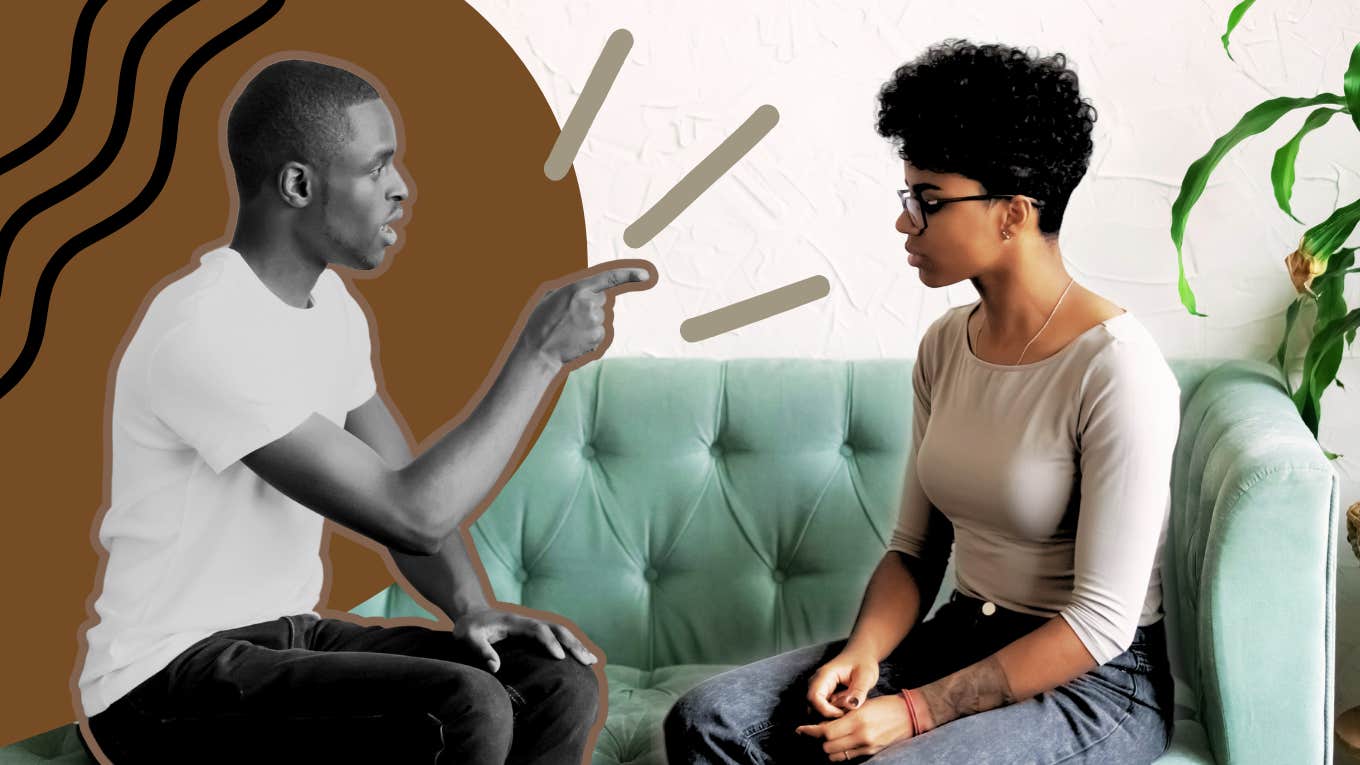11 Tiny Relationship Behaviors That Certainly Qualify As Emotional Abuse
Don't ignore these seemingly slight signs.
 fizkes | Canva
fizkes | Canva In the world of abuse, physical abuse gets all the attention. Emotional abuse gets treated as if it’s not that bad. But abuse is abuse. There’s not a type of abuse that’s “not that bad.” It all causes trauma and creates scars.
I grew up in a generation where child abuse was normalized. Spanking was considered discipline despite every single research study proving that it’s ineffective as a teaching tool and creates lasting damage. Emotional abuse was completely brushed aside.
The problem with normalizing abuse is that we can be in abusive relationships without even knowing it. We make excuses. We find reasons. We know that it doesn’t feel good and creates issues, but we allow it to continue — normalizing the abuse once more.
I ended up in an emotionally abusive relationship. At first, it was an errant comment here or there. A joke that missed the mark. A tone beneath a statement. Later, it intensified to ongoing character assassination at every turn and publicly berating me. When I think about it, I still experience a sense of unbelief that I was the person standing there cringing in a grocery store aisle while my then-partner enumerated my faults and hurled abuse at me.
It’s strange how the first feeling I experienced wasn’t a shock — it was shame. Yet, the shame wasn’t mine to carry. Being a victim of abuse is nothing we should be ashamed of, but we do need to learn to recognize the common behaviors that qualify as emotional abuse.
Here are 11 tiny behaviors that qualify as emotional abuse:
1. Criticism
Criticism is a common relationship behavior that qualifies as emotional abuse. It’s also one of the most destructive things we can do in relationships. Constructive criticism should sound more like non-judgmental feedback. What it shouldn’t sound like is abuse hurled at our partner. Nitpicking the things they say or do, constantly finding fault, and only focusing on the bad and never the good are ways that we break down our relationships — and the people in them. It’s normalized but make no mistake: It’s abusive.
My ex was a big fan of criticism. He hated a lot of things about me. He once spent an hour car ride enumerating my many faults in great detail. He took issue with who I was, what I did, and how I felt. Nothing was ever good enough. But it didn’t just happen in my worst relationship. Even in relationships I thought were safe and healthy tended to default to criticism. It was painful, but it just goes to show how much we normalize being critical of other human beings rather than kind.

Photo: Monstera Production/Pexels
2. Condescension/Belittling
Being condescending might give us a moment of feeling superior to the other person, but belittling them doesn’t make us bigger, stronger, or better. It just makes us abusive. Healthy relationships can’t exist when one or more partners feel it’s acceptable to treat the other person with condescension. Looking down on what they say or do or even who they are isn’t a cute look for any relationship. It’s far more common than we might realize because we often look away when it happens right in front of us. The person who makes their partner feel small in front of their friends is one example of this.
3. Gaslighting
The American Psychological Association defines gaslighting as “manipulating another person into doubting their perceptions, experiences, or understanding of events.” Gaslighting is usually accompanied by other behaviors, but I’ll explain how it happened to me. Early in the relationship, when I held him accountable for his behavior, he would twist what happened. He’d say I misunderstood because I was damaged and hadn’t been treated right in relationships. He’d tell a story that made it sound like it was all in my head. He always came out looking like the good guy, and I always came out a little more broken than I was before. I couldn’t tell what was real and what wasn’t.
Someone who makes us feel crazy for our thoughts or feelings is gaslighting us. Moreover, they’re abusing us. How we feel is valid. Anyone who tries to make us feel wrong or crazy about it is the real problem.
4. Bullying disguised as jokes
Bullies always default to the same line: It was just a joke. Only their jokes are consistently cruel to others. This is abuse disguised as humor, and we let people get away with it all the time. We laugh it off, and we hide the fact that the words hurt.
These jokes have always been abusive. The problem is that we don’t call them out for what they are. If someone’s sense of humor is dark, that’s fine. Mine is dark, too. But it shouldn’t be mean. Other people shouldn’t always be the butt of every joke. That’s not humor; that’s abuse.
5. Isolating from friends/family
An abusive person will naturally isolate us from friends or family. They won’t want the feedback they’ll get when other people witness the relationship dynamic. Usually, this starts as criticizing our friends. Anyone critical of the people we most value has the potential for abuse. People who love us want us to have strong social support. They don’t want us to be entirely reliant on them without access to any other healthy relationships.
Frankly, if someone doesn’t like our friends, that should be a warning sign for them that they don’t like us either. After all, our friends are a mirror. That’s a “them” problem that should probably be solved by leaving. Anyone who steers us away from healthy relationships by sowing seeds of discontent and driving a wedge in previously good relationships is doing something abusive.
RELATED: I Was In A Horrifyingly Abusive Marriage — And Didn't Even Know It
6. Brutal Honesty
There are always people who call themselves brutally honest who are just abusive. My ex was a person like that. After I had children, I was uncomfortable wearing bathing suits in public. It took a lot of courage for me to take my post-baby body to the beach. The person I was dating the first time I found that courage made sure I knew I looked awful. He wasn’t trying to hurt my feelings, he claimed. He just wanted to be brutally honest so that I didn’t embarrass myself.
Of course, I was humiliated. He took me to the store and bought me a suit he found appropriate and flattering. I wore it, but I felt shame the whole time. I had been afraid of being judged for my body, and he made sure I knew I was judged and found undesirable. It was a painful moment in my past, but I can now look back and see that brutal honesty is nothing more than cruelty and emotional abuse disguised as the truth. The real truth is that I looked fine, but he didn’t want me to feel good about myself.
The truth isn’t brutal. It’s kind. Even if it’s an uncomfortable truth, it still should be delivered with kindness. Someone who hurts our feelings to “help” us is just abusive.
7. Name-Calling
Our relationships shouldn’t feel like a playground where name-calling is the norm. Calling names has no place in adult relationships. We might default to that immature behavior because of how we grew up or what we’ve grown accustomed to in relationships, but it’s important to recognize that calling someone names is abusive. It’s not kind, and it doesn’t make any relationships better. It breaks down trust and damages self-worth.
8. Shaming
Holding someone accountable is not the same thing as shaming them. We can address behavior that we find problematic without pouring on blame and shame in the process. Yet so many relationships see no problem in shaming their partner — in public or in private.
I can still feel that crawling sense of shame as my former partner berated me in the grocery store. I remember seeing other people in the aisle darting glances our way. They might have been concerned rather than judgmental, but I still felt humiliated. That grocery store visit is the one point in my past where I had a block in my memory. I have no recollection of how I ended up from one side of the store to the other, but when I processed this in a trauma therapy session, I found that it didn’t matter. I wasn’t the one who should have been ashamed.
9. Yelling
Yelling at another person (regardless of age) isn’t just immature; it’s also abusive. I grew up in an environment where yelling happened regularly. It was a part of our dysfunction. I didn’t like it, and I was riddled with anxiety. But it also got normalized. It would take a lot of therapy before I stopped participating in this behavior and in the other abusive behaviors I had learned growing up.
Yelling should not be commonplace in relationships. Arguments can get heated without shouting. Disagreements can be had without it devolving into raised voices. It might require a cooldown or a break from communicating, but it’s necessary to avoid the abuse that is yelling at another human being.
I noted earlier the issue of age simply because many people feel it is acceptable to yell at children. That is also an abusive tendency. If we want to teach our children to calmly cope with life, we’ve got to learn to do a better job of it ourselves without raising our voices and defaulting into immature and abusive habits.
RELATED: How I Saved Myself From An Emotionally Abusive Man — And You Can, Too
10. Stonewalling
Stonewalling is not just a painful behavior that happens in relationships; it’s also abusive. Having someone ignore us, give us the cold shoulder, and shut down on us breaks down our relationships. They stop being a safe person that we can rely on. I experienced this one in a relationship I thought was going well. But there was a wall up that I could never get over. I could sense something was wrong, but I wasn’t being told what it was or what we could do to repair it.
Stonewalling doesn’t just damage the relationship. It damages the person we’re stonewalling. Relationships require vulnerability and communication. When one person shuts down and stops communicating with us, we’re left wondering what went wrong with no way of knowing how to fix it — or if it can be fixed at all.
We can say we need space if that helps. We can even ask for some time to sort out our thoughts before sharing them. What we shouldn’t do is shut down on the person who loves us and leave them feeling emotionally abandoned. It’s not kind. It is abusive.

Photo: Liza Summer/Pexels
11. Passive-aggressive social media posting
Can we talk about the passive-aggressive posters of the world? We all know them. Sometimes, we’ve been them. They’re the people who put up a random meme or comment that’s aimed at someone else. It’s passive-aggressive, and it lets everyone else know that we’re mad at someone about something without being more specific. But the person that we’re mad at knows that it’s meant for them. They’re the target, and our aim is good.
This happened to me with a former friend. How the friendship fell apart is a long story. I don’t think it’s a matter of blame. I don’t take issue with it ending, but I certainly took issue with how it ended. In the breakdown of that friendship, there was a lot of s**tposting happening on that person’s side. I would go to social media and find meme after meme about friends who had broken trust or turned out to be fair-weather friends. I knew they were about me, and I could tell from the comments section who else knew it was about me. It was ugly, and I didn’t deserve it.
Frankly, the whole end of that relationship was ugly, and I will never understand how it devolved to that point with the person I had trusted more than anyone else. Passive aggressive posts online aren’t just hurtful and immature; they’re abusive. If I’m honest, my younger and more immature self once engaged in this activity. But thankfully, I learned better and grew up. I realized that passive-aggressive behavior is still aggressive and abusive.
Recovering from Emotional Abuse
The first step to recovering from emotional abuse is to admit that it happened. It might sound simple, but this one took me about a year to manage. I didn’t ever want to be anyone’s victim — or to believe that I would ever, for a single solitary moment, tolerate abuse. But I did. I was a victim of emotional abuse. Once I admitted it, I could begin the recovery process.
If you believe the relationship is worth saving and that your partner might be willing to work on the problems, couples counseling could be an option. Keep in mind that only one person can save a relationship. It will take both parties being accountable and fully participating in the therapeutic process to heal a relationship that contains abuse. Trust will have to be rebuilt, and new communication habits will have to be developed. The Gottman Institute even offers a guide to managing the aftermath of conflict to help repair a relationship.
It’s important to remember that abuse doesn’t just happen to women. It can happen to anyone regardless of gender or orientation. It can happen in friendships, families, and romantic relationships. It’s never healthy, and it’s important to cultivate self-worth, strong communication skills, and firm boundaries to help eliminate abuse in our lives.
No one deserves to be treated this way. Our relationships should be safe, healthy spaces where we feel loved, accepted, and supported. We shouldn’t be dodging low blows, short tempers, and bad habits. By recognizing the signs of emotional abuse, we’re one step closer to calling it out and refusing ever to tolerate it again.

Photo: Anna Keibalo/Pexels
If you suspect that you’re in an emotionally abusive behavior, you can contact the National Domestic Violence Hotline at 1-800–799–7233 or text START to 88788 for assistance.
RELATED: The Surprises You Might Discover When Peeling Away The Layers Of Trauma
Crystal Jackson is a former therapist and the author of the Heart of Madison series. Her work has been featured on Medium, Elite Daily, Thought Catalog, The Good Men Project, Elephant Journal, and Mamamia.

